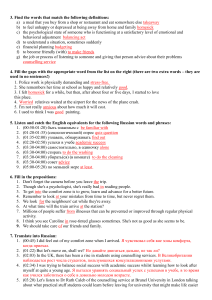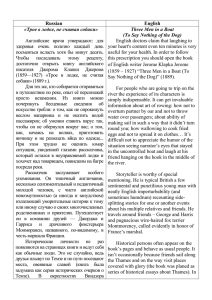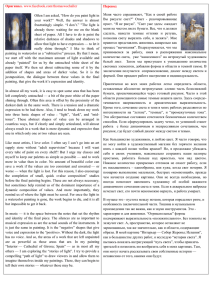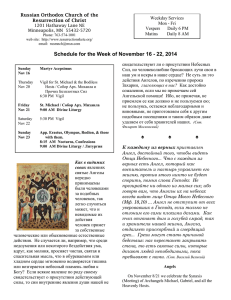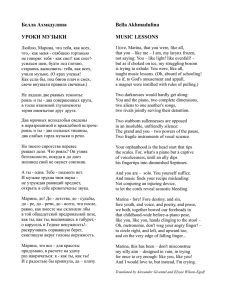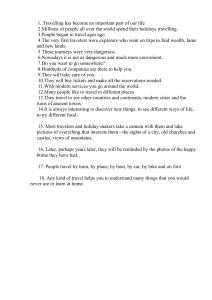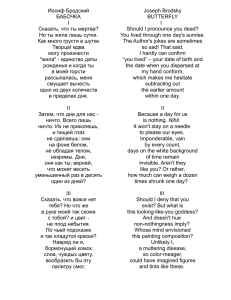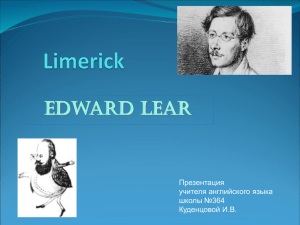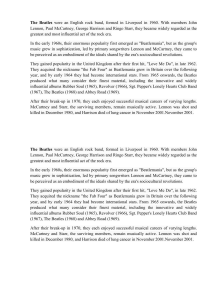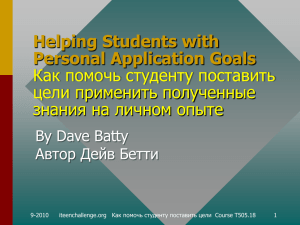Andreas Schönle "Ruin philosophy, poetic discourse, and the
реклама
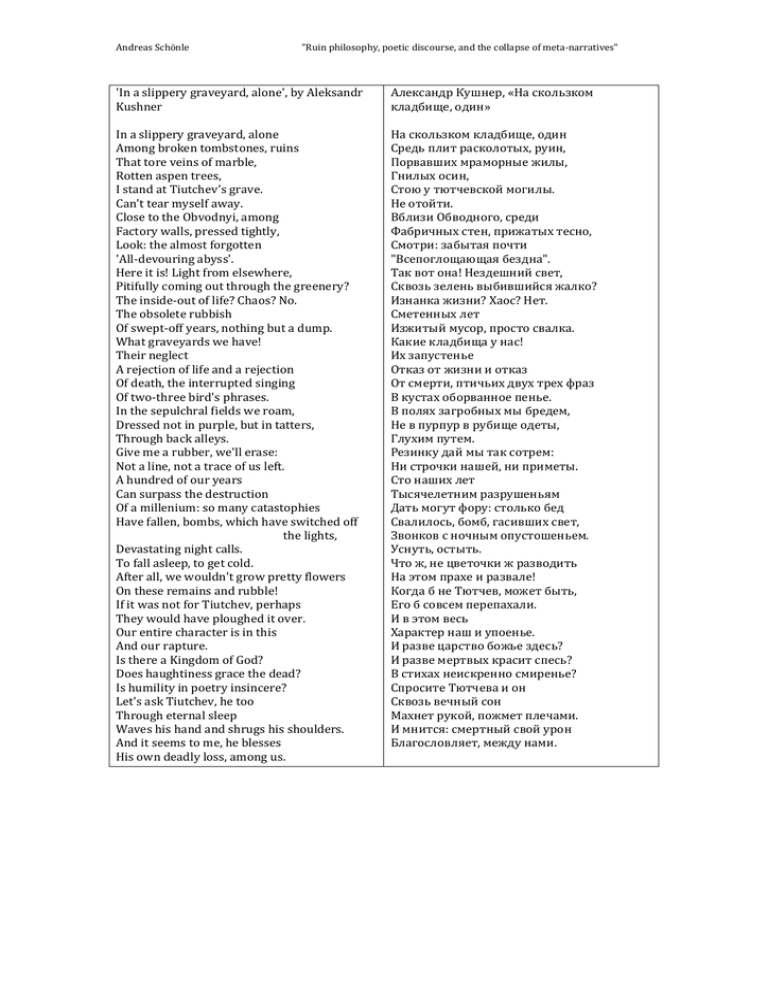
Andreas Schönle "Ruin philosophy, poetic discourse, and the collapse of meta-narratives" 'In a slippery graveyard, alone', by Aleksandr Kushner Александр Кушнер, «На скользком кладбище, один» In a slippery graveyard, alone Among broken tombstones, ruins That tore veins of marble, Rotten aspen trees, I stand at Tiutchev's grave. Can't tear myself away. Close to the Obvodnyi, among Factory walls, pressed tightly, Look: the almost forgotten 'All-devouring abyss'. Here it is! Light from elsewhere, Pitifully coming out through the greenery? The inside-out of life? Chaos? No. The obsolete rubbish Of swept-off years, nothing but a dump. What graveyards we have! Their neglect A rejection of life and a rejection Of death, the interrupted singing Of two-three bird's phrases. In the sepulchral fields we roam, Dressed not in purple, but in tatters, Through back alleys. Give me a rubber, we'll erase: Not a line, not a trace of us left. A hundred of our years Can surpass the destruction Of a millenium: so many catastophies Have fallen, bombs, which have switched off the lights, Devastating night calls. To fall asleep, to get cold. After all, we wouldn't grow pretty flowers On these remains and rubble! If it was not for Tiutchev, perhaps They would have ploughed it over. Our entire character is in this And our rapture. Is there a Kingdom of God? Does haughtiness grace the dead? Is humility in poetry insincere? Let's ask Tiutchev, he too Through eternal sleep Waves his hand and shrugs his shoulders. And it seems to me, he blesses His own deadly loss, among us. На скользком кладбище, один Средь плит расколотых, руин, Порвавших мраморные жилы, Гнилых осин, Стою у тютчевской могилы. Не отойти. Вблизи Обводного, среди Фабричных стен, прижатых тесно, Смотри: забытая почти "Всепоглощающая бездна". Так вот она! Нездешний свет, Сквозь зелень выбившийся жалко? Изнанка жизни? Хаос? Нет. Сметенных лет Изжитый мусор, просто свалка. Какие кладбища у нас! Их запустенье Отказ от жизни и отказ От смерти, птичьих двух трех фраз В кустах оборванное пенье. В полях загробных мы бредем, Не в пурпур в рубище одеты, Глухим путем. Резинку дай мы так сотрем: Ни строчки нашей, ни приметы. Сто наших лет Тысячелетним разрушеньям Дать могут фору: столько бед Свалилось, бомб, гасивших свет, Звонков с ночным опустошеньем. Уснуть, остыть. Что ж, не цветочки ж разводить На этом прахе и развале! Когда б не Тютчев, может быть, Его б совсем перепахали. И в этом весь Характер наш и упоенье. И разве царство божье здесь? И разве мертвых красит спесь? В стихах неискренно смиренье? Спросите Тютчева и он Сквозь вечный сон Махнет рукой, пожмет плечами. И мнится: смертный свой урон Благословляет, между нами. Andreas Schönle "Ruin philosophy, poetic discourse, and the collapse of meta-narratives" 'Ruins', by Aleksandr Kushner Александр Кушнер, «Руины» For complete bliss only ruins Were missing and so they put them up In alleys from material Such that they look like chaos Of marble, dust, and rubble, Granite masonry and crumbling bricks. Для полного блаженства не хватало Руин, их потому и возводили В аллеях из такого матерьяла, Чтобы они на хаос походили, Из мрамора, из праха и развала, Гранитной кладки и кирпичной пыли. And they liked, climbing on the fragment, To stand on it and sigh, grief-stricken. Amids the diluted darkness of the North, Rose the mirage of Mycenea and the Parthenon The powdered descendant of Tatar hordes Revered Felten and Cameron. И нравилось, взобравшись на обломок, Стоять на нем, вздыхая сокрушённо. Средь северных разбавленных потёмок Всплывал мираж Микен и Парфенона. Татарских орд припудренный потомок И Фельтена ценил, и Камерона. If only they had known, what Graves and destruction the world would see. From childhood remember the naked skeletons The stiff face of sorrow without expression. Ruins ... Let others admire How elder blooms among the dilapidation. Когда бы знать могли они, какие Увидит мир гробы и разрушенья! Я помню с детства остовы нагие, Застывший горя лик без выраженья. Руины… Пусть любуются другие, Как бузина цветет средь запустенья. I remember the destroyed neighbourhoods The rusted beams listing and hanging How horrible you are, ideals of yore How bitter, amourous partings And the sudden collapse of old friendships Desperation and disappointments! Here is a man who looks like a ruin, A gaping hole in his eyes. Such a breach, and wound, and avalanche You won't see in the Dresdens and the Brests. Even home grew repellent to the ravaged son And there is no oblivion in departures. Friends, hold on to the railings, To this bush, to paintings, to a line To the best we had in life To the inconsistency of misery and interruption This temple was destroyed not by lighting, It was conceived in this way. Let's put a stop. In this meticulously correct wreck Why seek another, bloody and rusty? We know where to find the ruins, in the past. And the future, perhaps, is besides the point. Go away, ragged ghost, in the haze of the northern lights, Or stay here, but as a childish amusement. Я помню те разбитые кварталы И ржавых балок крен и провисанье. Как вы страшны, былые идеалы, Как вы горьки, любовные прощанья И старых дружб мгновенные обвалы, Отчаянья и разочарованья!. Вот человек, похожий на руину. Зияние в его глазах разверстых. Такую брешь, и рану, и лавину Не встретишь ты ни в Дрезденах, ни в Брестах. И дом постыл разрушенному сыну, И нет ему забвения в отъездах. Друзья мои, держитесь за перила, За этот куст, за живопись, за строчку, За лучшее, что с нами в жизни было, За сбивчивость беды и проволочку, А этот храм не молния разбила, Он так задуман был. Поставим точку. В развале этом, правильно-дотошном, Зачем искать другой, кроваво-ржавый? Мы знаем, где искать руины: в прошлом. А будущее ни при чём, пожалуй. Сгинь, рваный призрак, в мареве сполошном! Останься здесь, но детскою забавой.
